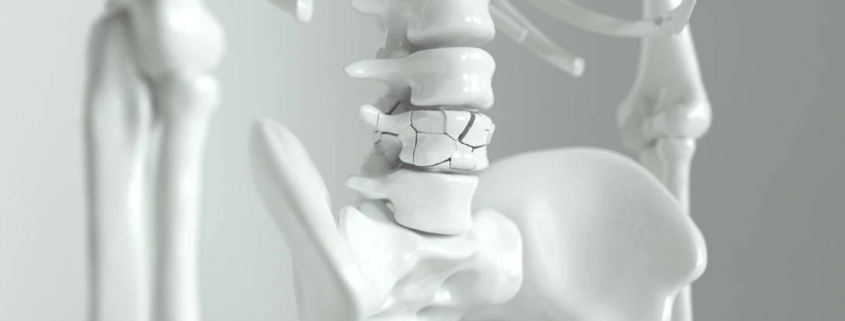Autoimmune Disease & Bone Health: What You Need to Know
If you’ve been following me for a while, you know I like to share not just recipes, but my real-life health journey that shapes why I do what I do. Early in 2025, my story took a turn I wasn’t expecting: I fell on the stairs and suffered a compression fracture in my mid-back (let me tell you, this is NOT fun!). After an ER visit and insisting on X-rays, I was simply told to follow up with my GP and look into bone density—shockingly, no one even mentioned I had a fracture! Luckily, my GP visit two days later confirmed a thoracic compression fracture and suggested I may have osteoporosis. Months later, I’m still waiting for bone density testing.
Living with Hashimoto’s, Fibromyalgia, and a rare gastrointestinal autoimmune disease, I already juggle fatigue, brain fog, and pain. But osteoporosis? That wasn’t even on my radar—until it suddenly was. I found myself thinking, “Why didn’t anyone warn me sooner?” Over the years, no one from my health team—GPs, functional MDs, or even my AIP coach—had ever flagged bone health. I only started learning about the impact autoimmune disease can have on bones after digging into osteoporosis research post-fall. I discovered there’s “primary” and “secondary” osteoporosis, and it’s not just a disease of older adults.
Strangely enough, during the 2025 AIP Summit, nutritional therapy practitioner and AIP coach Liz Delizia gave a powerful presentation on autoimmune health and bone density—but I missed it until the replay. Her talk connected many dots for me, and I want to share some key insights—mixed with my own experience—in hopes it sparks you to take action before you’re in the same fragile boat.
Why Bone Health Should Be on Your Radar
As women, we often think about menopause and bone loss as a later-life issue. Doctors tend to frame osteoporosis as something to worry about in your 60s or 70s. But if you have autoimmune disease, your bone health can be impacted at any age.
Bone density loss can start earlier—especially during perimenopause and menopause, when estrogen declines accelerate bone breakdown (yup—that can mean your 40s!). Autoimmune conditions like Hashimoto’s, celiac disease, rheumatoid arthritis, MS, IBD, and other GI diseases contribute extra risks: chronic inflammation, nutrient malabsorption, and medication side effects (from steroids, immunosuppressants, PPIs, NSAIDs) disrupt the bone remodeling/rebuilding process. Thyroid hormone imbalances can speed up bone turnover. Add chronic stress, disrupted sleep, and reduced activity to the mix, and you have a perfect storm for weakening bones.
Even restrictive diets like AIP, while anti-inflammatory and gut-supportive, can send up red-flags for some. We need to pay special attention to intake of calcium and other bone-supporting nutrients during the elimination stage when dairy is out. Focus on non-dairy sources like dark leafy greens, broccoli, canned fish with bones, sesame seeds, and other nutrient-dense foods—or talk to your practitioner about safe supplementation. And remember, AIP elimination is never meant to be forever—getting back on the most diverse diet that your body will tolerate as soon as possible is the goal.
My Wake-Up Call
I never imagined I’d deal with a fracture—I follow AIP, eat nutrient-dense foods, avoid inflammatory triggers, and move daily. I do however, struggle with sleep and stress, and with dairy not being my friend as a regular part of my diet, I admit I’ve probably not been diligent enough about my calcium, K and D intake.
Please, learn from my mistakes—with Hashimoto’s and gastrointestinal disease, I should have been far more proactive and definitely should have established a baseline scan as soon as autoimmune diagnoses arise, not after the stair that broke this camel’s back. Don’t wait until menopause—or until it’s too late.
Insights & Actions from Liz Delizia’s 2025 AIP Summit Talk
1. Get Tested Earlier
Understand the risk factors and advocate for yourself. There’s no universal age for a DEXA bone density scan if you’re autoimmune, but risk factors matter. If you’ve been on steroids, have thyroid disease, celiac, gastrointestinal disease, or a family history of osteoporosis, advocate for a baseline scan—even in your 20s or 30s, it can give you peace of mind.
2. Bone Loss Is Silent
Osteoporosis and osteopenia are typically symptomless until a fracture occurs. You won’t “feel” weak bones. For me, on a rare occasion I’d felt a sharp pain in the thoracic area where my fracture occurred, but I never would have guessed it was a bone density issue. Normal blood calcium levels doesn’t reflect bone strength—your body will pull calcium from bone to keep blood levels steady.
3. Focus on nutrient density. Calcium, vitamin D, magnesium, and vitamin K2 all support bone strength. Prioritize foods you absorb well (in the early days of my gastro disease, I had to cook all of my veggies, so more carrot sticks and salads aren’t always the answer!), and remember that supplements are only effective if your body can use them. Gut health matters.
4. Incorporate weight-bearing movement. Resistance training, walking, yoga—move in ways that challenge your bones safely—Motion is lotion! Focus some of your training time on balance and flexibility to help avoid future falls and fractures. If you already have a fracture, be sure to consult with your medical practitioner to learn what to avoid (for me, even my gentle restorative yoga practice had to change for a while).
5. Holistic Thyroid & Autoimmune Care
If you have thyroid disease, make sure your levels are optimal not just normal. Insist on a full thyroid panel to get a better handle on how your thyroid is functioning (TSH, Free T4, Free T3, Reverse T3, TPO antibodies and TGAb). Address autoimmune inflammation to support bone remodeling. Supplements can help, but only if your body can absorb them—gut health matters.
By combining testing, lifestyle strategies, and whole-body care, to heal your autoimmune disease, improve gut health and reduce inflammation—all indirectly protect your bones.
How AIP Supports Bone Health
The Autoimmune Protocol (AIP) is about more than soothing gut symptoms—it’s a whole-body approach that supports bone health too. By focusing on gut healing, reducing inflammation, and prioritizing nutrient-dense foods, quality protein, and healthy fats, AIP helps your body absorb the vitamins and minerals bones need to stay strong. Avoiding sugar, alcohol and ultra-processed foods keeps inflammation in check, while prioritizing sleep, recovery, stress management, appropriate movement, human connection and getting out in nature ensures your body has the foundation to maintain healthy bone density. As highlighted in the 2025 AIP Summit, this comprehensive approach not only calms autoimmune symptoms but also indirectly supports your skeleton—because when the body thrives, your bones do too.
Beyond Bones
Osteoporosis is only one part of the story. Autoimmune conditions ripple across your whole body—affecting energy, gut health, hormones, mood, heart, and sleep. Supporting bones is really about supporting your whole ecosystem. When you nourish your body, move thoughtfully, manage stress, and work closely with your healthcare team, you’re not just protecting bones—you’re building a foundation for total wellness.
Words of Wisdom
If my compression fracture taught me one thing, it’s this: bone health deserves a seat at the autoimmune conversation much earlier than most doctors suggest. Don’t wait. Get curious. Get tested. Take action now.
If you want to dive deeper, check out the 2025 AIP Summit recordings, especially Liz Delizia’s session on autoimmune health and bone health—it’s where much of the information I’ve shared here originated, and it’s full of practical, hopeful insights.
Bones aren’t just structure—they’re strength. Feed them, move them, honor them.

